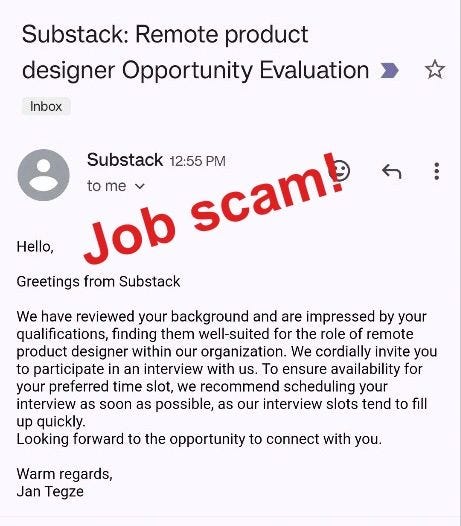How Do You Know a Job Offer is Legit?
Searching for a new job? Learn the top warning signs of employment scams so you can protect yourself and find legitimate remote work. Tips from a career expert.
Are you searching for a remote job online? While the internet has made it easier than ever to find work-from-home opportunities, it's also opened the door for scammers looking to prey on unsuspecting job seekers. Online job scams are on the rise, using increasingly sophisticated tactics to trick people into handing over sensitive personal and financial information.
As a career expert who has helped countless professionals navigate the world of online job hunting, I've seen firsthand how devastating falling for an employment scam can be. Not only do victims waste valuable time and energy pursuing fake leads, but they can also suffer identity theft, financial losses, and a painful hit to their confidence.
The good news is, by educating yourself on the warning signs of job scams, you can learn to quickly identify and avoid fraudulent opportunities. Knowing what red flags to watch for will help you stay safe, protect your personal information, and focus your search on legitimate remote jobs that align with your skills and goals.
In this guide, I'll walk you through the most common tactics online job scammers use, and teach you proven strategies for spotting fake job ads, verifying real employers, and steering clear of "too good to be true" offers.
How My Name Became Part of a Scam
Before we dive into the warning signs of online job scams, I want to share a personal story that happened to me just this week - and could happen to anyone. Several job seekers reached out to ask if I was really hiring for a Remote Product Designer role at Substack. The truth is, I wasn't.
Scammers had stolen my name and identity to create a fake job ad, likely to collect personal information from applicants or scam them out of money. I still do not know why they use someone like me with a unique name instead of someone with a more common name who would be harder to reach.
But maybe I just made someone unhappy, and they're trying to get back at me in a weird way. Scammers can use anyone's identity to lend false credibility to their schemes.
So what can you do if you discover scammers using your name or a company's brand in a fake job ad? Honestly, not a ton, since they can easily move on to using other names.
But here are a few steps I recommend:
If the scammers are using a specific domain name, look up who registered it on Who.is. But this “Raymond Ali” isn't based in San Francisco; their real address is in Nigeria, where I was able to track their real location.
Inform the company being impersonated (in this case, Substack).
If you have technical skills, find out where the scam website is hosted or what DNS they are using, and report it to those providers as well, this will interrupt their communication.
You can also check what email servers the scammers are using via tools like Mxtoolbox and report abuse.
If candidates impacted by this scam message you and ask you if you're actually hiring, ask them for a screenshot or any material those scammers are sharing with them. This can give you some insight into how they communicate, and you can then take action and report them on Discord, Teams, and other platforms.
If you're active on social media, consider sharing a post about the scam to educate your network and warn other job seekers (My LinkedIn post)
If it’s serious, definitely let the police know too.
While we can't prevent scammers from misusing names and logos, we can get savvier about spotting fakes. In the rest of this guide, I'll teach you the most common red flags of job scams and how to protect yourself.
How Do I Know if an Online Job Offer is Legit?
One of the biggest challenges of online job searching is that it can be tough to tell the difference between real opportunities and clever fakes. Scammers are betting that you'll be so excited by an interesting job prospect that you won't pause to scrutinize the details. Don't fall for it!
Here are some of the most common warning signs that an online job offer may be a scam:
1. Unsolicited offers that seem too good to be true.
If a company reaches out to you out of the blue with a job that pays way more than market rates and requires few qualifications, be very suspicious. Legitimate employers don't need to cold-contact candidates and make over-the-top offers.
2. Vague job descriptions that lack specifics about duties.
Real job postings give plenty of detail about the day-to-day responsibilities, skills required, and how performance will be measured. If you read a job description and still can't picture what you'd actually be doing, consider that a red flag. Scammers keep things intentionally vague.
3. Companies that want your sensitive info but haven't interviewed you.
Legitimate hiring managers always want to evaluate your qualifications, communication skills, and fit for the role. They will absolutely insist on interviewing you before offering you a job. If the company is asking for your social security number, bank info, or other private data without so much as a phone screen, run the other way.
4."Employers" who ask you to pay money for equipment or training.
With very few exceptions, it's not normal to have to pay your employer for anything required to do your job. If a company insists that you need to purchase a specific computer, software, training program, starter kit, etc. before you can start working, chances are very high it's a scam.
5. Contact Details
If you receive a job offer from a recruiter claiming to represent IBM but using an email from an outlook.com or any unofficial domain, treat it as a potential scam. Legitimate companies like IBM use their official domain, such as ibm.com, for all communications.
If the email ends in unusual domain like .lol or .me, that's a major red flag. One reliable way to verify if an offer is genuine is to closely examine the recruiter's email address and domain. Often, these scam emails come from free or suspicious domains, so don't hesitate to do a quick check before engaging further.
Always do your research before engaging too deeply with any online job prospect. Take the time to verify that the company and job are legit, especially if something feels "off." It's not rude or paranoid to protect yourself from scammers - it's smart.
How Do You Detect or Identify an Online Scam?
In addition to the red flags we covered above, there are a few more tell-tale signs that an online job opportunity might be a scam.
Keep your eyes peeled for these sneaky tricks:
Offers for jobs via SMS from random phone numbers
If you receive a job offer through a text message from an unfamiliar number, especially for positions you never applied for, it's often a scam. Legitimate employers typically use official channels to communicate, such as email or professional job platforms. Be cautious of unsolicited job offers that seem too good to be true—it's a clear sign to investigate further before responding.
Requests for payment for anything related to the job.
As mentioned earlier, legitimate jobs don't require you to pay for equipment, training, software or starter kits. But scammers may also ask you to pay application fees, background check fees, or even "deposits" to secure the position. Don't fall for it - real employers cover all these costs.
Emails riddled with typos, poor grammar, and unprofessional language.
While anyone can make the occasional spelling mistake, a job-related message full of glaring errors is a big warning sign. Legitimate companies have professional communications staff who proofread important emails. Scammers often have poor writing skills or use bad translation software.
High pressure to respond immediately or else lose the opportunity.
Scammers know that if you have too much time to think, you might start poking holes in their story. So they'll often try to pressure you with "act now, this amazing job won't be available for long!" This is a classic sales tactic, not something you'll encounter with real employers, who want you to take the time to make informed decisions.
Job postings on sites like Craigslist or social media.
While it's not impossible to find legitimate jobs on these platforms, they are absolutely crawling with scammers. It's best to focus your search on reputable job boards and company websites. If you do pursue a lead from a general classifieds site or social media, be extra diligent in looking for other red flags.
Remember, if something about an online job posting makes your spidey senses tingle, don't ignore that feeling! It's always better to be overly cautious than to fall victim to a scam. Trust your instincts.
How Do I Not Get Scammed When Looking for a Remote Job?
Now that you know the warning signs of online job scams, let's talk about some proactive steps you can take to protect yourself during your remote job search.
Stick to reputable job boards and company websites.
While it's tempting to search far and wide for opportunities, you'll have the best luck and the lowest risk on established job search platforms like LinkedIn, Indeed, Monster, and CareerBuilder. You can also go directly to the websites of companies you admire and trust to see if they have any remote openings listed.
Research companies thoroughly before providing any personal info.
Before you even apply, take the time to verify that the company is legitimate. Check for a professional website, look up their registration and physical address, search for news articles and press releases, and see if you can find real employees on LinkedIn. If everything checks out, then proceed with your application.
Be extremely wary of jobs that involve receiving/reshipping packages or transferring funds.
A common scam is to "hire" people to receive merchandise, repackage it, and mail it somewhere else, or to transfer money between accounts. In actuality, these scammers are using you to aid in their theft and money laundering operations, which could implicate you in crimes. Steer clear!
Never send money or provide your financial details to an employer.
With very rare exceptions (like some government jobs that require a credit check), employers have zero need for your bank account or credit card numbers, and they certainly shouldn't be asking you to send them any money. If a potential employer insists on getting your financial details or a payment from you, end communication immediately.
Use separate email addresses and phone numbers for your job search.
This is a smart way to keep your primary email and phone number private until you're certain an employer is trustworthy. You can easily set up a free email account and Google Voice number to use just for job searching. That way, if you do get scammed, your main accounts aren't compromised.
Be cautious about interview platforms.
Reputable companies typically conduct interviews using well-known platforms like Zoom, MS Teams, or Google Meet. If you're asked to use platform like Discord or some unfamiliar software or receive a direct link to download some application, be wary. This could be a sign of malware or an attempt to gain access to your system. Always prioritize your security!
By following these guidelines and keeping a sharp eye out for red flags, you can significantly reduce your risk of falling prey to an online job scam.
Do Scam Jobs Send Offer Letters?
You might think that getting an official job offer letter means you're in the clear, but unfortunately, scammers have caught onto this tactic too. It's not uncommon for fake employers to send very real-looking offer letters, complete with company logos and formal language.
So how can you tell if an offer letter is legit? Here are a few things to look out for:
The offer comes before you've had any real interaction with the company.
Real jobs involve multiple steps, like submitting an application, doing interviews, providing references, and maybe even completing a test assignment. If you receive an offer letter without going through a thorough vetting process, be very suspicious.
The offer letter asks for sensitive personal info or payment.
Just like with job postings, legitimate offer letters will never request money or your bank account, social security, or credit card numbers. Those requests are a sure sign of a scam.
You can't verify the sender or company.
Before celebrating any job offer, always take a few minutes to research the sender's email address, the company website, and the physical address (if provided). If you can't find evidence that the company and contact are real, or you spot discrepancies (like a Gmail address rather than a company domain), proceed with extreme caution.
The language is vague, unprofessional, or full of errors.
While not all legit offer letters are perfect, most are quite standardized and use formal, professional language. If the letter is strangely vague about the job duties, includes lots of typos or grammatical issues, or uses an overly casual tone, that's a red flag.
Remember, a job offer is a major life decision - don't let excitement cloud your judgment. Take the time to carefully review and verify any offer letter before responding or providing sensitive info. When in doubt, have a trusted friend or family member review it too.
How Do You Verify an Employer is Real?
One of the most important steps in avoiding online job scams is to verify that the employer and job opportunity are legitimate. Here are some strategies for confirming a company is real:
Check for a professional website and online presence. Most legitimate companies have a well-designed website with information about their products/services, leadership team, contact info, and job openings. They also usually have active social media accounts and a presence on business directories like Google My Business or Glassdoor. If you can't find much about a company online, that's a red flag.
Look up the company on business databases. Sites like Glassdoor, Crunchbase, and the Better Business Bureau allow you to search for company profiles and read reviews from real employees and customers. You can also check government business registration databases to see if the company is properly incorporated and licensed. If a company is nowhere to be found on these sites, be very cautious.
See if you can find current employees on LinkedIn. Do a search for the company name on LinkedIn and see if real people list it as their employer. You can even reach out to a few employees and politely ask about their experience with the company and hiring process. If the company has zero LinkedIn presence or the employees seem fake, consider that a warning sign.
Call the company's listed phone number. If a company website lists a phone number, give it a call to verify it's a real working number. Ask the person who answers for more info about the job opening you're interested in. If the number is disconnected or the person can't provide basic info about open roles, that's not a good sign.
Check the company's registration and physical address. In the US, most companies need to be registered with the Secretary of State in the state where they operate. You can search state business registration databases online to verify a company's legal status. Also be sure to Google the company's listed address and look at it on Google Street View - if it's a fake address or an empty lot, you'll know something is fishy.
By taking these steps to verify an employer's legitimacy, you'll save yourself a lot of time and potential heartache. It's much better to spend a few extra minutes researching a company upfront than to waste hours pursuing a scam job.
How to Identify a Fake Company
In addition to verifying that a company is legitimate, it's important to be able to spot the signs of a fake company. Here are some of the most common red flags:
Lack of online presence. If a company claims to be well-established but has a bare-bones website with little information and no social media or digital footprint, that's a major warning sign. Real companies put effort into their online presence and reputation.
Missing or vague company info. Legitimate companies are transparent about their leadership team, headquarters location, contact info, and mission. If you can't find any of these basic details, or the info provided is suspiciously vague, proceed with caution.
No evidence of real employees or customers.
Do a quick Google and LinkedIn search for the company name and see if you find real people associated with it. If the company claims to have been in business for years but you can't find a single employee or customer testimonial, that's concerning.
Company name or branding that mimics a well-known brand.
Scammers often create fake companies with names and logos that are very similar to recognized brands, hoping job seekers won't notice the difference. Always double-check the company's URL and cross-reference with the real company's site to spot any discrepancies.
If you spot any of these red flags, take it as a sign to dig deeper before engaging with the company. Better safe than sorry!
Job Posting May Be a Scam
Searching for any job can feel overwhelming, especially with the constant threat of online scams. But by educating yourself on common red flags and taking steps to verify jobs and companies, you can avoid falling prey to fraudsters and focus your energy on legitimate opportunities.
Remember, if a job posting or offer seems too good to be true or gives you a funny feeling, trust your instincts. It's always better to miss out on a "maybe" opportunity than to get sucked into a scam.
Stay vigilant, do your research, and don't let the scammers win!








